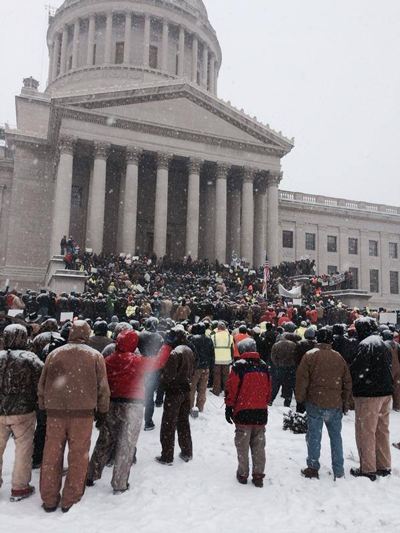Government affairs
Legislative Updates

Working families continue to face attacks on numerous fronts, with the battleground expanding from Capitol Hill to state capital.
In 2015, state lawmakers appear poised to continue their assault on middle-class Americans’ livelihoods, voting rights and ability to bargain collectively.
Some of the biggest struggles that working families encounter take place in state capitals, where legislators and governors set the agendas. Since 2011, in states where newly elected Republican governors and lawmakers took office, the agendas that have been embraced often are blueprints for advancing corporations’ influence—agendas such as lowering wages, suppressing voting rights and eliminating workers’ on-the-job protections.
Rather than create jobs to allow state and local economies to grow, many state lawmakers are playing politics by pushing bills such as so-called “right to work” legislation.
Meanwhile, union members—along with allied community organizations across the country—are championing legislation that would put working people back on the job and make corporations pay their fair share.
Here are some laws that states are debating with the intent to threaten middle-class wages and collective-bargaining rights:
- “Right to work” laws are designed to prohibit agreements between labor unions and employers requiring union membership—and therefore the payment of union dues—as a condition of employment.
- “Paycheck deception” laws are designed to deliberately make it difficult for workers to make voluntary political contributions to their unions’ political action committees (PACs) as a way for these unions to compete with corporations’ power and money. Paycheck deception laws require unions to obtain written consent every year to solicit voluntary political contributions from union members.
- Project labor agreements (PLAs) are collective-bargaining agreements between building trade unions and contractors that govern the terms and conditions of employment for all workers—union and nonunion—on construction projects. Yet some state lawmakers, backed by the construction industry, want to cut the wages of those workers by eliminating PLAs on public construction projects.
- Wage theft is the illegal withholding of wages or the denial of benefits rightfully owed to an employee. It can manifest itself in various way, including an employer’s failure to pay overtime, minimum wage violations, worker misclassification, illegal deductions in pay, forcing workers to work “off the clock,” or not paying workers at all. Only a few states are starting to address the problem through legislation—but the vast majority of states have wage theft–protection laws that are grossly inadequate.
- Following the lead of Wisconsin and Ohio, several states have eliminated or severely restricted the rights of teachers, fire fighters, police officers and other public workers to bargain over pay, benefits, job safety, working conditions.
Please continue to check back as state initiatives take center stage.



